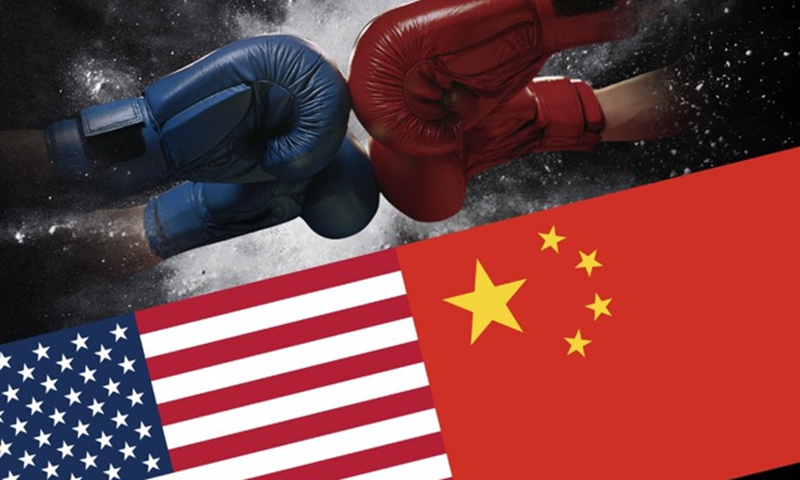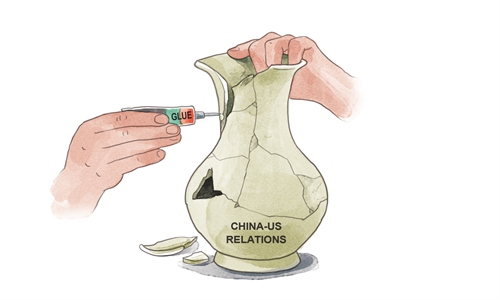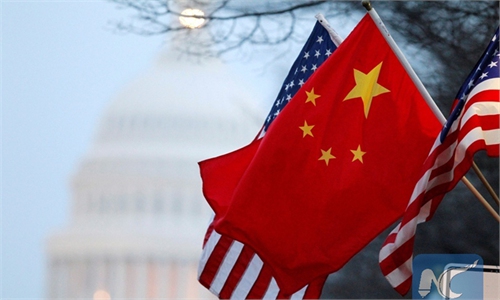
China US Photo: GT
China and the US are two powers with super strength. Both of them are quite complicated, so is the competition between them. However, I think it's too simplistic if we use the concept of a clash between two civilizations or between two systems to describe China-US relations.I believe what bolsters the two countries' competition is the strength built on their political systems and the nature of their civilizations. Both China and the US have the political demands to demonstrate the superiority of their own systems.
But China's demand is inward. China's aim is to consolidate the Chinese people's confidence rather than dwarf the US. At least in this period, China has no strategic ambitions to eliminate Western capitalism. The primary stage of socialism takes quite a long time to achieve, transcending several generations. Therefore, for the Chinese people, different systems can coexist without having to see each other as enemy.
So what on earth are China and the US competing for? In my view, the main dilemma revolves around the right to development in this stage of history.
That is to say, China, in order to fulfill people's demands for a better life, must continue to develop as quickly as possible - but the US wants to thwart China's development.
The US hopes to reestablish its position as the center of the global development. The US' natural desire for development involves the country's deep worries about China's development from a geopolitical perspective.
In my view, Americans will only feel at ease as long as the US can quicken its own development, enjoying a rising GDP while China's GDP growth rate slows down. But this is not what the Chinese people want. China needs to develop faster than the US. This is not only a political desire, but also a reflection of the Chinese people's wishes to live a better life.
Some netizens said Trump's four-year tenure created a strategic opportunity for China, so they nicknamed Trump as "Chuan Jianguo," (meaning Trump builds China). I see it this way: The China containment strategy advocated by Trump definitely added unexpected pressure on China and had an unfavorable impact on China's development. There is no doubt that it was a negative factor to China's development.
But China is strong, sober-minded and dedicated. China stresses doing its own things well as the basic pathway, and launched serious countermeasure toward US strategic suppression efforts. During this process, the Trump government destabilized the US and smashed many Chinese people's worship of the US system. US suppression also broke some illusions of the Chinese people. Chinese society has become ever more united, which is an important spiritual resource for China's fast and steady development in the following phases to come. From this perspective, Trump's rule indeed brought some strategic benefits for China.
From a broader perspective, I think this is a strategic vision that extends beyond short-sighted gains, and a philosophical analysis weighted with a historical sense.
Of course, comments made on the internet are a simple way of expressing self-encouragement and confidence. And the result speaks everything: When Trump left the White House, all relevant assessments of China's development were better than when he entered the White House on the first day. In this sense, he deserved the nickname "Chuan Jianguo."
As for the new US President Joe Biden, Chinese netizens gave him another monicker: "Bai Zhenhua" which literally means Biden who makes China prosper. It is anticipated that the Biden administration will continue strategic suppression policies toward China. But Trump failed in his attempt to suppress China, Biden has even fewer means and resources to pressure China compared with four years ago. Trump and his followers like Mike Pompeo have used all possible means to trip up China, while the Biden team can only make minor adjustments that they believe suit US interests. It remains to be seen how much courage and wisdom they have, and how they might make adjustments.
The author is editor-in-chief of the Global Times. opinion@globaltimes.com.cn




